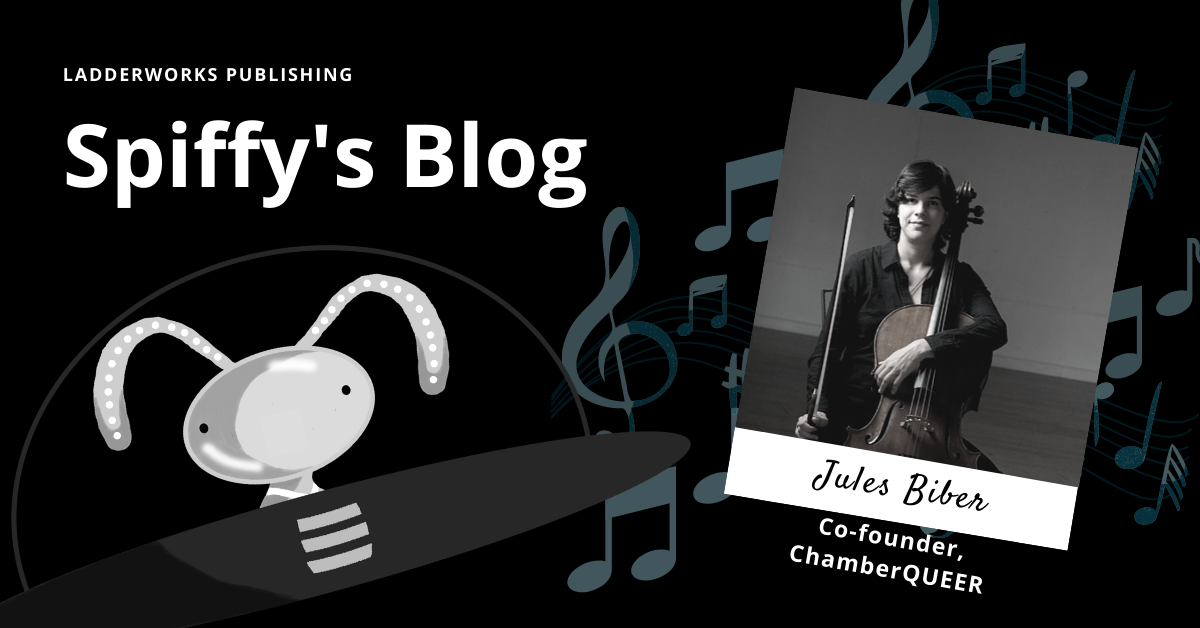Bringing Chamber Music to QUEERantine

Hi y’all, Spiffy the interplanetary journalist back with another interview from Planet Earth. I’m here with Jules Biber, classical musician and Co-founder of ChamberQUEER – and it sounds like she’s playing something now!
SPIFFY: Hi Jules, those are some beautiful sounds! Tell me about how you’re changing classical music.
Jules: Thanks for having us, Spiffy! We are always happy to talk about how we are looking to change the world of classical music.
Classical music is one of the so-called “high” art forms of Western art. Here in the United States, we think of it as taking place in extravagant concert halls, where people dress up and buy expensive drinks at intermission. The institutions responsible for curating what classical music is are huge non-profits with big endowments and well-compensated CEOs. This hierarchy doesn’t lead to an equitable landscape for artists or composers creating classical music. In fact, classical music is decades behind other art forms in welcoming and celebrating diverse perspectives amongst its artmakers – there are healthy conversations and programming decisions about equity happening in visual art, dance, and theatre.
ChamberQUEER recognizes a unique opportunity in our field. Not only is queer visibility in the United States still an issue, even in these other arts industries, but the queer community has so much diversity within it because queerness is something that occurs in every group of people, regardless of race, class, age, ability, and all other identities. We can create a space within classical music where we could begin to point out what’s missing, and start thinking about how to change it.

Pictured Left to right: Jules Biber (she/they); Danielle Buonaiuto (she/they); Brian Mummert (he/him); Andrew Yee (they/them).
Spiffy: A worthy conversation, what inspired you to start it?
Jules: As queer musicians who took private music lessons, went to conservatory, began professional careers, and have started to gain recognition, each of us co-founders has felt the lack of visibility at every stage of our development. We began having conversations with others who felt the same way, and the more we talked about it, the more we realized it wasn’t just us. At the same time, the conversation started by #MeToo created room to discuss gender parity and diversity in classical music, and very recently, the conversation around racial diversity and black visibility became urgent. We felt very motivated to enter the conversation when we did!
Spiffy: And exactly how are you changing the conversation around classical music?
Jules: By curating the work of queer artists alongside the classical mainstream, giving a platform to underrepresented voices, and creating immersive, interactive programming in community spaces, we take a new approach to present and consume classical music.
We strive for accessibility at all concerts, with a “pay what you can” policy and ADA-compliant venues. We do what we love and we are kindly, thoughtfully challenging the dominant paradigm in HOW we do it.
SPIFFY: What have you been doing to open your conversation to people at home?
Jules: Because of COVID-19, we had to cancel our annual concert festival. Instead, we organized a two-week online festival. Over 50 artists answered our prompt: “what does being a queer musician mean to you?” As one viewer put it their work ranges from “gut-wrenching to laugh-out-loud.”
Being online means we can reach a wider audience and group of artists. We see it as an opportunity to learn how we can use technology effectively while staying loyal to our art form in its essence – the live concert.
SPIFFY: How has this challenged you as an entrepreneur?
Jules: It’s been tricky for us to get grant and foundation funding because we exist in a space between music organizations and advocacy organizations, and it’s hard to find the right fit or tell our story in a way that resonates with funders directly and without mediation. However, we persist! We know that we’re a young organization and establishing our presence by making an impact in our community tells the strongest story. We have confidence that our mission is vital to a significant demographic of people, and we have been grateful to see from our generous individual donors that we aren’t alone in this.
SPIFFY: What is something you've learned unexpectedly from someone recently?
Jules: The incredible visionaries at the helm of the recent swell of Black Lives Matters protests have taught us that we must do better, as a society and that action is the only way forward. For ChamberQUEER as an organization committed to representing and serving an intersectional population, that means not just creating space for people of color, but actively centering them in curatorial and organizational decisions. We all learned very quickly what listening looks like – and what true allyship is. We are grateful for those leaders who have made it possible for all of us to learn to engage in true anti-racism work.
ChamberQUEER was founded in 2018 by Jules Biber, Danielle Buonaiuto, Brian Mummert, and Andrew Yee with a mission to program queer artists and composers; highlight historically under-represented queer figures in classical music; and provide an inclusive and intersectional space in classical music for artists and audience alike, through concerts, community events, and education programs.
We’d love you to join the rest of ChamberQUEERantine! Join them LIVE every night at 7 PM EDT until June 23, at facebook.com/chamberqueer.


